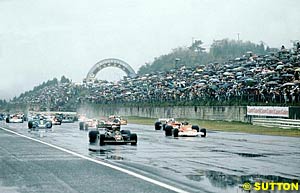
Atlas F1 Magazine Writer
How many times did a Championship leader also win the title in the last season round? What are Kimi Raikkonen's chances of ousting Michael Schumacher at Suzuka? And how many times before did a Championship leader lose the title due to retirement? Marcel Schot brings the answers and more anecdotes on the final round of 2003
In the past thirty years, 13 Championships were decided in the last race. In only six of those cases the leader going into the last race also won the Championship:
Looking at this list, it becomes clearer that Kimi Raikkonen's chances are very slim indeed. The largest gap that was overcame in the final race was six points - when Nigel Mansell's tyre exploded at Adelaide in 1986, allowing Alain Prost to win the Championship.
1976 was a special case. Niki Lauda had been dominant all through the season, until disaster struck at the Nurburgring. The Austrian was leading the Championship with 61 points - 31 ahead of Jody Scheckter and 35 ahead of James Hunt - when he crashed and nearly died in the German Grand Prix. Lauda made a miracle recovery, but after he missed the Austrian and Dutch races, Hunt was only 14 points behind. And, when Hunt won in Canada and America, the gap was reduced to only three points coming to Japan.
Qualifying at the Fuji circuit had both drivers close together, Hunt in second and Lauda in third, while Lotus driver Mario Andretti grabbed pole. The teammates of Hunt and Lauda were a long way behind - Ferrari's Regazzoni in seventh and Hunt's McLaren teammate Jochen Mass way back in 12th. On race day, rain was pouring down exceptionally hard, having several drivers question whether it was at all safe to start the race.
The race went underway as planned, though, and Hunt grabbed the lead from the start. However, by lap two the Championship fight took an unusual turn: Niki Lauda pulled into the pits, withdrawing from the race. The Austrian simply valued his life over the Championship. This left Hunt free to take it easier. The Briton finished third in the end, winning the Championship.
So all in all no less than eight last-race Championship deciders ended in one of the contenders retiring from the race, and in three of these cases the Championship leader lost the title because of it.
Looking at the past results at Suzuka, anything speaks in Michael Schumacher's advantage. There's no statistical category the German doesn't lead. Since 1994 he finished on the podium in every race bar one - the 1998 race, where he retired with a blown tyre. Furthermore, Schumacher won the race in the last three Japanese Grands Prix.
Qualifying at Suzuka also appears to be a specialty of Schumacher. In the last five races he scored pole position. Over those five years, only Mika Hakkinen was able to come within four tenths of Schumacher's pole, on three occasions.
Fellow title aspirant Kimi Raikkonen of course has less of a history at Suzuka. However, in his first season with McLaren last year, the Finn drove a good race, which he saw rewarded with a third place finish. However, back then there was no pressure on the young gun - whereas now Raikkonen needs a win, something he has managed only once so far, earlier this year in Malaysia. In Suzuka we'll see how he performs when the pressure's on.
As the Formula One circus moves to the land of the rising sun, we're getting ready for the grand finale of the 2003 season, and for the first time since 1999 the Championship is going to the wire. However, the 2003 Championship is more than just a battle between two drivers, it's also a clash between young and old, the new generation versus the five time World Champion.
 However, there's always the chance of retirement for Schumacher. In 1998 Schumacher retired, albeit in a virtually hopeless position at the time. In 1997 the German put himself out of the final race after ramming into rival Jacques Villeneuve. In 1996 Villeneuve was the one who retired while having a small chance to win the title in his debut year. 1994 of course was the year when Schumacher and Hill collided, both retiring from the race. As mentioned before, 1986 was another year where a retirement sealed the championship. In 1983 Alain Prost retired in the final race, giving Piquet the title. Three years before, Nelson Piquet spun off while having a small chance.
However, there's always the chance of retirement for Schumacher. In 1998 Schumacher retired, albeit in a virtually hopeless position at the time. In 1997 the German put himself out of the final race after ramming into rival Jacques Villeneuve. In 1996 Villeneuve was the one who retired while having a small chance to win the title in his debut year. 1994 of course was the year when Schumacher and Hill collided, both retiring from the race. As mentioned before, 1986 was another year where a retirement sealed the championship. In 1983 Alain Prost retired in the final race, giving Piquet the title. Three years before, Nelson Piquet spun off while having a small chance.
 In Suzuka not only the Drivers' Championship is at stake - the Constructors' Championship will also reach a last race climax. For the first time since 1997 Williams has a chance to grab the title and keep Ferrari from winning their fifth consecutive Championship. However, if the Maranello team wins, that will be a record. Currently the record for most consecutive Constructors' Championships is held by Ferrari (1999-2002) and McLaren (1988-1991).
In Suzuka not only the Drivers' Championship is at stake - the Constructors' Championship will also reach a last race climax. For the first time since 1997 Williams has a chance to grab the title and keep Ferrari from winning their fifth consecutive Championship. However, if the Maranello team wins, that will be a record. Currently the record for most consecutive Constructors' Championships is held by Ferrari (1999-2002) and McLaren (1988-1991).
|
Volume 9, Issue 41
Atlas F1 Exclusive
Interview with Pizzonia
Fisichella: Through the Visor
Atlas F1 Special
Rear View Mirror Special
Half a World Away
GP Preview
2003 Japanese GP Preview
Japan Facts & Stats
Columns
The Fuel Stop
The JV Trivia Quiz
Bookworm Critique
On the Road
Elsewhere in Racing
> Homepage |